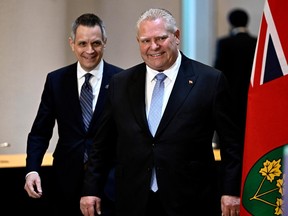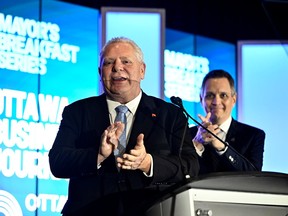The agreement won’t solve all of Ottawa’s financial challenges and it doesn’t represent new money that can be spent as the city chooses, Mayor Mark Sutcliffe says.

Article content
The Province of Ontario will “upload” responsibility for Highway 174. Two city sites will be identified to build modular housing. There will be a new police operations centre in downtown Ottawa.
Premier Doug Ford was in Ottawa on March 28 to announce a $543-million “new deal” with the city bringing $346 million in capital funding over the next 10 years and $197 million in operating support over the next three years.
Advertisement 2
Story continues below
Article content
Article content
On Wednesday, city council approved the agreement and learned more about what would be coming.
“This is a half-billion-dollar lifeline for Ottawa,” Mayor Mark Sutcliffe told councillors.
The agreement won’t solve all of Ottawa’s financial challenges and it doesn’t represent a lot of new money that can be spent as the city likes, Sutcliffe said, but it is a “historic” investment in public safety, rural roads, rapid transit and economic development and revitalizing downtown Ottawa and the ByWard Market, he said.
“It also helps us deal with significant budget pressures for the next few years.”
Sutcliffe and senior city bureaucrats revealed more particulars about some components of the deal, although some information and timelines remained unclear.
Here was what councillors heard on Wednesday:
- The province is “uploading” the costs costs of maintaining and improving Highway 174 in Ottawa’s east end. These responsibilities have cost the city millions since they were downloaded from the province to the city in 1997. “That not only fixes a historic wrong, but it will also save us millions of dollars in the future,” Sutcliffe said. Maintenance for the 27-kilometre stretch from the Highway 417 split to the city limits will receive $9 million from the province over three years and $47 million over the same period of time to cover capital projects.
- The city has agreed to assign its rights to the province to receive and retain the consideration from The Ottawa Hospital Riverside Agreement. Short explanation: It facilitates 256 long-term care beds that the hospital is developing. This was a “non-negotiable item” for the province, city manager Wendy Stephanson said.
- The city has committed to submitting a plan to improve the safety of residents, tourists and businesses in the ByWard Market and the transit system in the next 120 days in exchange for funding to implement the plan. This includes funding for police and city services to revitalize the Market area, mental health and well-being, such as an initiative for intake, triage and dispatch of mental health and substance calls that will divert calls from 911.
- The province has committed S120 million over three years to support initiatives for homelessness, including permanent overflow emergency shelter sites to transition from temporary emergency hotels, motels and recreation centres. There will also be support for community shelter providers, day programs and emergency overnight shelter respite. Ford and Sutcliffe have also committed to creating a city-province working group.
- The province is clarifying the requirement to have police at construction sites, which could potentially lower construction costs, Stephanson said. This is one of several “non-financial” supports the province is exploring with the city. Others include alternative opportunities for debt financing and debt funding flexibility.
- The province has asked the city to identify two pieces of surplus land to build low-rise modular “attainable” ownership housing that can be built quickly. There is a timeline for identifying the sites in the agreement in order to get the land ready for development, Stephanson told councillors, although she declined to name candidate sites. According to the CMHC definition, “attainable” housing consumes no more than 30 per cent of a household’s pre-tax income.
- The city has committed to working with the province to “explore opportunities” to help ensure housing is available through tools such as the vacant home tax and the provincial non-resident speculation tax.
Advertisement 3
Story continues below
Article content
Among next steps, the city must work with the federal government to obtain an almost equal amount of funding. Some pieces of the agreement with the province are contingent on federal funding.
The city has requested that the federal government commit to $493 million in funding, Stephanson said.
“We need long-term commitment and funding from the federal government for refugee and asylum seekers who are coming to Ottawa and challenging the stability of our shelter system,” she told councillors. “We need long-term commitments to manage excess costs related to managing protests and demonstration in the nation’s capital.”

The city will also be seeking federal commitments for housing and infrastructure and support for the city as the federal government divests itself of office buildings.
There’s a lot of work ahead, including a transfer payment agreement so the money can flow to Ottawa as quickly as possible, Stephanson said.
Some items will come before city committees and council as well as to the provincial government for consideration and debate. Stephanson said she would be reporting on progress at the end of 2024.
Our website is your destination for up-to-the-minute news, so make sure to bookmark our homepage and sign up for our newsletters so we can keep you informed.
Recommended from Editorial
Article content


Comments